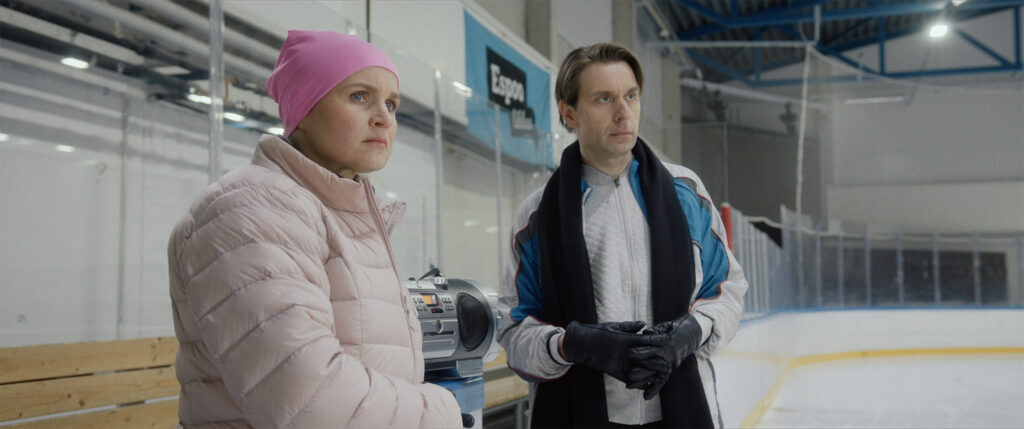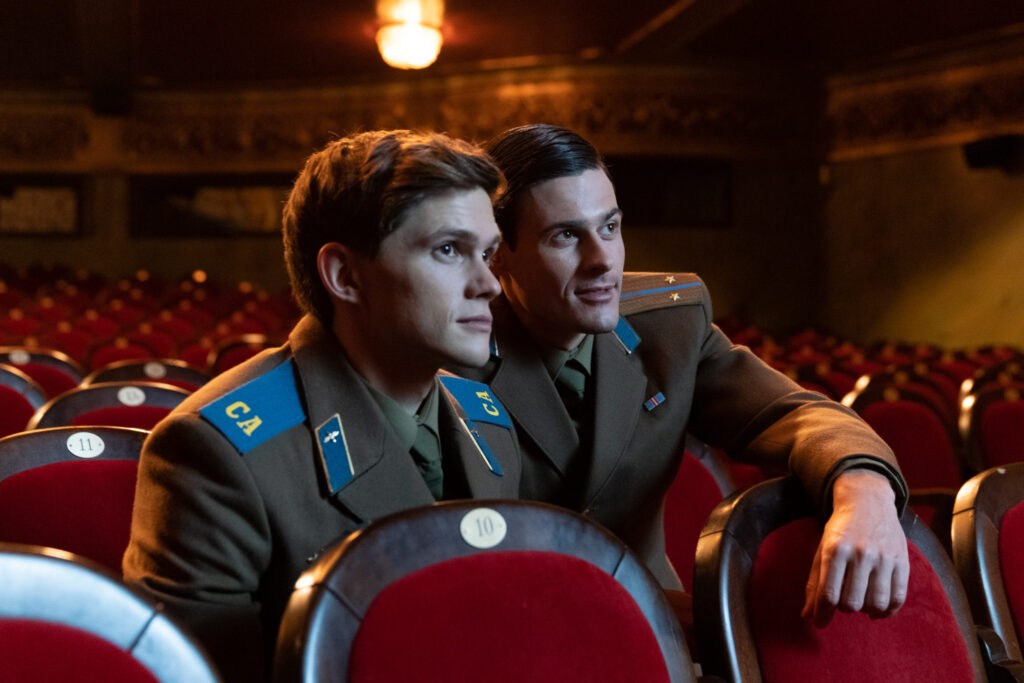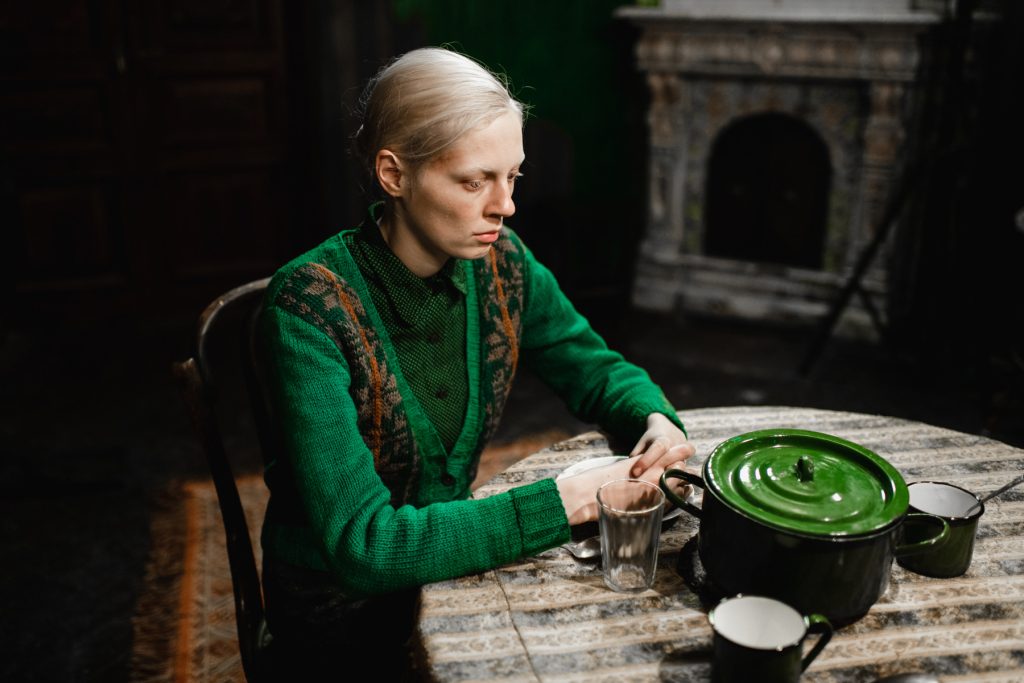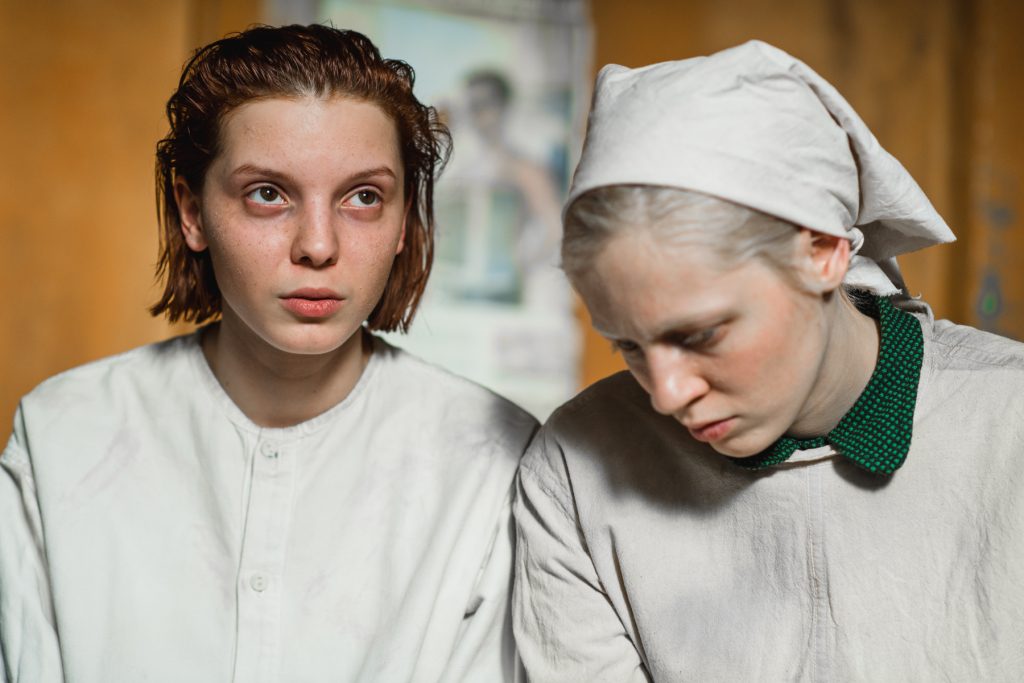April 8, 2023
by Carla Hay
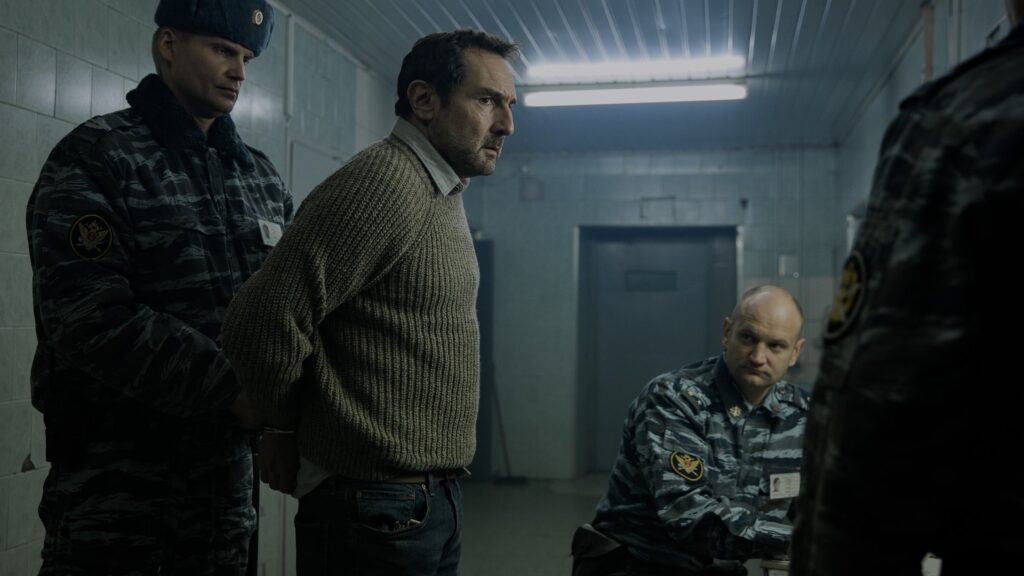
Directed by Jérôme Salle
Russian and French with subtitles
Culture Representation: Taking place in Russia and Estonia, the dramatic film “Kompromat” features an all-white cast of characters representing the working-class and middle-class.
Culture Clash: A French diplomat living in Russia is falsely accused of child sex abuse, and he breaks out of jail to go into hiding and possibly try to prove his innocence.
Culture Audience: “Kompromat” will appeal primarily to people who are interested in watching political thrillers, even if these thrillers stretch the bounds of credibility.

“Kompromat” delivers great suspense, and it benefits from an absorbing lead performance from Gilles Lellouche, but the movie becomes more far-fetched as it goes along. It weakens the intended message that everything in this drama could happen in real life. “Kompromat” is supposed to be “based on a true story,” but what mostly rings true is the conspiracy aspect of the story, not what happens after the main character escapes from prison. His prison escape is already revealed in the “Kompromat” trailer.
Directed by Jérôme Salle (who co-wrote the “Kompromat” screenplay with Caryl Ferey), “Kompromat” has a title that is the Russian word for documents used to destroy someone’s reputation. In the case of this story, the person whose reputation is destroyed is a French diplomat living in Irkutsk, Russia. His name is Mathieu Roussel (played by Lellouche), and he works as the director of the French Alliance, which is a cultural exchange between France and other countries. Some sections of “Kompromat” are told in flashbacks, so viewers have to put pieces of the narrative puzzle together.
Part of Mathieu’s job is promote French culture in Siberia, Russia. In the beginning of the story, Mathieu is well-respected by his colleagues, which include a woman named Michèle (played by Judith Henry), who is the cultural attaché at the French Embassy in Russia. Mathieu is shown giving a well-received speech, where he thanks Andrei Ivanovich (played by Mikhail Safronov), who is the equivalent to being Mathieu’s Russian counterpart. Mathieu is sought-after by the media, because a TV network wants to interview him.
As for his personal life, Mathieu and his wife Alice Roussel (played by Elisa Lasowski) have had a somewhat cold and distant relationship lately. Their marriage has become strained because Alice didn’t want to relocate from France to Russia. Alice really wants to move back to France, but Mathieu likes how things are going with his job in Russia.
Mathieu thinks the problems in their marriage aren’t serious enough where he and Alice will separate. Alice and Mathieu are both devoted parents to a daughter named Rose (played by Olivia Malahieude), who’s about 5 or 6 years old. The spouses also have a nanny named Julia (played by Larisa Kalpokaite), who works part-time for the family.
Mathieu makes a fateful decision to bring a French experimental performing arts show to a big Russian theater. There’s a homoerotic aspect to the show, when two shirtless men dance on stage and then kiss passionately. Even though there are only adults in the audience, Mathieu underestimates how conservative Russia is when it comes to public homosexuality. There are noticeable uncomfortable and disgusted reactions from several members of the audience. A few people walk out of the venue after seeing these two men kiss each other.
Mathieu knows this performance was not as well-received as he hoped it would be. He goes to a nightclub and gets drunk. One of the people he sees in the club is a young woman he was briefly introduced to in the venue’s foyer before the performance. Her name is Svetlana (played by Joanna Kulig), who works as a French-language teacher for the French Alliance.
Svetlana and Mathieu do some flirty dancing with each other at the nightclub. Someone at the nightclub who notices this flirtation is Dmitri Rostov (played by Mikhail Gorevoy, also known as Mikhail Gor), who has a brief conversation with Mathieu, by asking him if Mathieu thinks Svetlana is pretty. “Do you know her?” Mathieu asks.
Mathieu doesn’t find out until much later that Dmitri is Svetlana’s father-in-law. Svetlana is in a very unhappy marriage to Dmitiri’s abusive and insecure son Sasha Rostov (played by Daniil Vorobyov), who is an alcoholic. Sasha frequently accuses Svetlana of cheating on him. Dmitri and Sasha are in the same line of work, which is later revealed in the movie and which will have a direct effect on what happens to Mathieu and Svetlana.
Shortly after this performance and nightclub encounter, that’s when Mathieu’s troubles start. He is suddenly arrested without warning at his home, in front of Rose and Julia the nanny. In a police interrogation room, where Mathieu is handcuffed to a chair, he is told that he has been arrested for distributing child pornography and for sexually molesting Rose. Mathieu is in shock and vigorously denies the charges. “It’s impossible,” he says when told what he’s been accused of doing.
Mathieu gets put in a jail without bail and without being able to speak to an attorney right away. He’s in a jail cell with about 10 other men. One of the men, who is the obvious bully leader, demands that Mathieu tell him why Mathieu was arrested. Mathieu is smart enough to know that people arrested for sex crimes against children get the worst abuse in prison, so Mathieu lies and says he doesn’t know why he was arrested.
The inmate thug tells Mathieu: “There are three categories of men here: Men we respect, men we beat, and men we fuck.” The bully also warns Mathieu that there are ways to find out why Mathieu was arrested. Of course, the other inmates find out why Mathieu was arrested, which leads to scenes of Mathieu getting brutally attacked and humiliated.
With Michèle’s help, Mathieu gets a well-respected attorney named Mr. Borodin (played by Aleksey Gorbunov), who tells Mathieu some very bad news: The Russian government has framed Mathieu with false documents and has already decided that Mathieu will get 10 to 15 years in prison. This is information that’s also revealed in the “Kompromat” trailer, which shows about 80% of the movie’s plot.
A shocked Mathieu gets even more disturbing news when he finds out it wasn’t just the controversial homoerotic dance performance that got him in trouble with the Russian government. Someone very close to Mathieu betrayed him, in order to get him out of the way and fulfill a specific agenda. After Mathieu finds out about this betrayal, he doesn’t think he has anything left to lose, so he escapes from jail before going to trial. This jail escape is a plot development that’s also revealed in the “Kompromat” trailer.
The “Kompromat” trailer also reveals that Mathieu gets help from Svetlana in going on the run from law enforcement. Also shown in the trailer are some pivotal fight scenes that really should have been left out of the trailer. And so, if anyone sees the “Kompromat” trailer before watching “Kompromat,” then many things that should have been surprises have already been revealed.
The only things that the “Kompromat” trailer don’t reveal about the movie are (1) whether or not Mathieu gets captured after he goes on the run and (2) whether or not Mathieu and Svetlana become romantic involved with each other. The last third of the movie has some hard-to-believe occurences. For example, Svetlana is suspected of helping Mathieu, but she’s never put under the type of surveillance that she would get in real life. This lack of credibility doesn’t ruin the movie, but it does make the end of the film look phony.
However, there are many parts of “Kompromat” that are very realistic and harrowing, thereby making up for the flaws in the movie. Lellouche gives the type of engaging performance that makes it easy to root for Mathieu to get out of his nightmare situation and reunite with his loved ones. And if this movie is “based a true story,” then it’s based on an untold number of people who’ve been the victims of real-life kompromat situations.
Kulig as Svetlana also performs well in the movie, but Svetlana’s storyline has a very noticeable contradiction to lowers the movie’s credibility: Svetlana’s husband and father-in-law are controlling and have ways of spying on her, but Svetlana can also can slip away for extensive periods of time to travel with Mathieu for long distances. The ending of “Kompromat” looks like a compromise for the sake of an expected formula. But at that point in “Kompromat,” viewers should know that the movie has traded in realism for a heightened version of reality, in order to ramp up the action and suspense.
Magnet Releasing released “Kompromat” in select U.S. cinemas, on digital and VOD on January 27, 2023.


